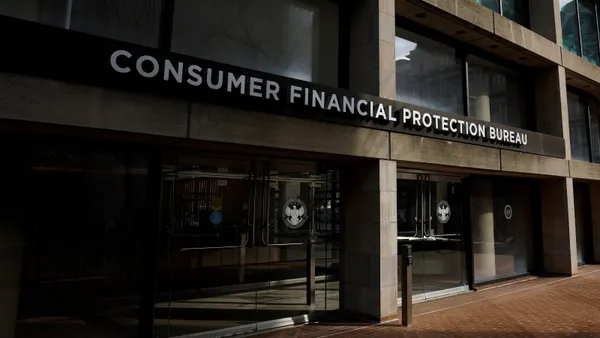Dive Brief:
- The Consumer Financial Protection Bureau on Friday dismissed its case against Comerica Bank, without prejudice, meaning the bureau could refile the lawsuit.
- In March, the bureau had requested a 90-day stay in its lawsuit against Comerica, which was filed in U.S. District Court for the Northern District of Texas by the Biden-era CFPB. The bank, in turn, asked the judge to deny that request, which Judge Jane J. Boyle did March 10, saying the bureau had “failed to explain how staying this case would be in the interest of justice,” and doing so presented a “fair possibility” of harming Comerica.
- The bureau dismissing the case without prejudice stands apart from a handful of other dismissals by the CFPB under the second Trump administration, which have been done with prejudice, meaning the CFPB can’t revive the lawsuits. The bank declined to comment. The CFPB didn’t immediately respond to a request for comment Monday.
Dive Insight:
Last month, the consumer watchdog had requested a stay in the case to give new agency leadership time to review the case, including its position on Comerica’s motion to dismiss.
In December, the CFPB – led by former Director Rohit Chopra – sued Comerica for allegedly “systematically failing” 3.4 million federal benefits recipients who held Comerica’s Direct Express prepaid cards with intentionally poor customer service and illegally harvested junk fees.
The CFPB alleged the bank intentionally dropped some 24 million customer service calls with holders of its Direct Express prepaid card, and subjected callers who were not dropped to “excessively long wait times — often in excess of several hours” to speak with a representative about unauthorized transactions, charge disputes, or lost or stolen cards.
The CFPB also accused the bank of charging ATM fees to cardholders who were legally entitled to free withdrawals, mishandling complaints from consumers who said they had been fraudulently enrolled in the Direct Express program, and repeatedly failed to address complaints of fraud in an appropriate time period or provided “vague and confusing findings” to potential fraud victims.
That lawsuit came one month after Comerica sued the bureau, asserting the CFPB’s investigation of the bank’s handling of the Direct Express prepaid card program – which began in 2021 – was “aggressive and overreaching.”
The Dallas-based bank had argued a stay in the CFPB’s “meritless” lawsuit would “prolong the reputational harm the Bank has been forced to endure,” and would give the CFPB an unfair advantage by allowing it about four months to craft its opposition brief to Comerica’s motion to dismiss.
Since President Donald Trump returned to the White House, the CFPB has dropped a number of lawsuits filed during the final months of the Biden administration. The bureau has dismissed lawsuits – all with prejudice – against JPMorgan Chase, Bank of America, Wells Fargo and Zelle parent Early Warning Services; against Capital One; and against SoLo Funds.
The CFPB last month also asked a federal judge to vacate a settlement with Townstone Financial and return $105,000 to the mortgage firm.
Last November, the Treasury Department named BNY as the financial agent for the Direct Express program, after the Treasury had informed Comerica it would be choosing a different program partner. BNY took over in January, but Comerica agreed to work alongside the New York City-based bank for three years to facilitate the transfer.













